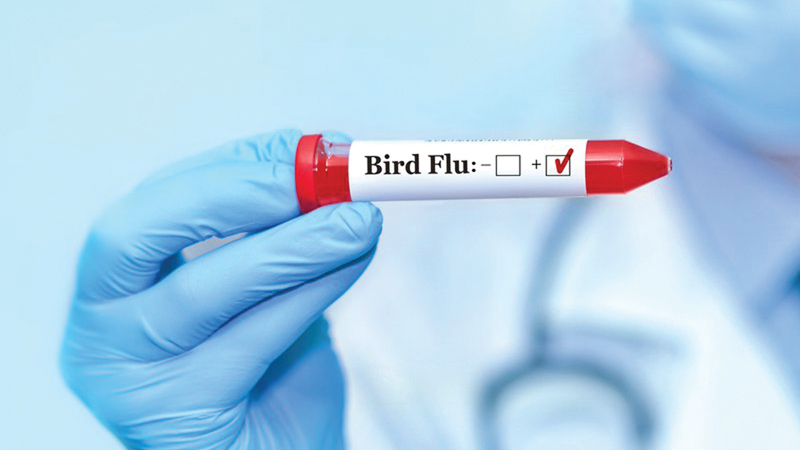 The spread of bird flu globally has raised concerns among health officials battling against other diseases. The Sunday Observer spoke to Dr C.S. Botenne, Virologist, Medical Research Institute to explain how the disease for which there is still no vaccine is spread and how we can protect ourselves.
The spread of bird flu globally has raised concerns among health officials battling against other diseases. The Sunday Observer spoke to Dr C.S. Botenne, Virologist, Medical Research Institute to explain how the disease for which there is still no vaccine is spread and how we can protect ourselves.
Excerpts of the interview:
The spread of bird flu in different parts of the world including Sri Lanka’s neighboring countries such as India and Pakistan has raised concerns among health authorities here of the possibility of this disease spreading to our island and prompting a health alert to the public.
Since most people are ignorant about this disease, could you tell our readers what bird flu is? Is avian flu and bird flu one and the same thing? Does it affect only migrant birds such as water fowls, wild duck, geese, storks etc? Or can it also spread to domestic poultry such as chicken and ducks?

Dr C.S. Botenne
Avian or bird influenza mean the same. It is an infectious type of the influenza A virus that spreads among birds. Infected birds can shed the virus in their droppings, nasal secretions and saliva.
Domesticated birds such as chicken, ducks, turkeys can also get infected with the virus through direct contact with infected waterfowl and other migrant birds or through contact with surfaces that are contaminated with the virus.
Q: I read that the disease could also affect animals such as cats, dogs, cows ,goats and pigs if they come into contact with an infected animal. Your comments?
A: Yes, there have been cases of infected cats , dogs, goat kids and dairy cows over the years in countries such as Thailand, Germany, Poland, South Korea and North American countries.
Q: What about humans being infected? Can an infected bird or animal pass it on to them?
A: Humans can get infected by touching infected birds, touching droppings or beddings, killing or preparing infected poultry for cooking , markets where live birds are sold could also be a source of bird flu.
Q: Is human-to-human transmission possible if an infected person lives in the same house as a non infected person? If so, how? Could the infection spread from nasal drops or touching contaminated surfaces?
A: The human-to-human spread of the virus is very rare. It usually spreads to only a few people, so sustained transmission is unlikely. Most cases of human-to-human transmission takes place after prolonged close contact without protection. Although rare, it can occur, as you correctly mentioned, if someone inhales the virus from the air or touches a contaminated surface and then their eyes, nose or mouth. It’s still important to monitor and be on the lookout for human-to-human transmission, even if it’s uncommon, because of the potential of pandemics.
Q: What about eating cooked chicken or eggs contaminated by the virus? If so, can the virus infect a person? What are the chances?
A: If chicken, eggs or any poultry are thoroughly cooked, the chances of infection are minimal. Pasteurised milk and dairy products are also safe to consume. However, drinking raw or unpasteurised milk carries an increased risk of serious illness, as it hasn’t undergone pasteurisation to eliminate harmful microorganisms.
Q: Are there different categories of bird flu? If so, what are they?
A: There are two categories of avian influenza viruses. They are low pathogenic avian influenza A virus (LPAI) and highly pathogenic Avian influenza A virus(HPAI). This division depends on their molecular characteristic which means on specific details in their genes and its ability to cause disease and death in chickens. So as the name suggests, low pathogenicity avian influenza causes either no disease or mild disease whereas the highly pathogenic type causes either severe disease or death in chicken/poultry. Only some avian influenza A(H5) and A(H7) viruses are classified as HPAI A viruses, while most A(H5) and A(H7) viruses circulating among birds are LPAI A viruses.
Q: What is the most common strain of bird flu?
A: The commonest type of Avian influenza in birds is H5N1 whereas the types of avian influenza frequently infecting humans are H5NI, H7N9 and H5N6.
Q: Which is more dangerous and why?
A: The subtypes which I have mentioned above gives rise to more severe disease and death among humans and therefore they are considered dangerous
Q: Do the strains mutate and change over time?
A: Yes, of course. Avian influenza poses a high pandemic risk because it has the potential to mutate and gain the ability to spread between people. If this occurs, the disease may become severe and infect a large number of people.
Q: What are the symptoms to look out for in suspected cases of bird flu?
A: Bird flu in humans include symptoms such as high temperature, aching muscles, headaches, cough, sore throat, and shortness of breath. There can also be symptoms such as diarrhoea, chest pain, conjunctivitis , bleeding from the nose and gums.
Q: Can it be mistaken for some other disease such as bronchitis or viral influenza?
A: Yes, it can, as all of these conditions can present with respiratory symptoms such as fever, headache, cough and shortness of breath, making it difficult to differentiate.
Q: What are the complications that could arise if not detected and treated in time?
A: The main complications may include worsening of chronic lung conditions, such as asthma or cystic fibrosis; ear and sinus infections; failure of the respiratory system, known as acute respiratory distress syndrome; kidney problems; heart problems; bleeding in the lungs; a collapsed lung; bacterial pneumonia and a life-threatening condition called sepsis, in which your organs do not function properly due to infection.
Q: How is it diagnosed? If someone with suspicious symptoms comes to your clinic how do you determine whether he/she has the disease? Is it with a blood test or X-ray? Walk us through the usual procedure.
A: If a patient comes to the hospital or clinic with the aforementioned symptoms, doctors usually gather a history from the patient. They will specifically look into factors such as travel history and any exposure to poultry if there is a suspicion of avian influenza. The doctor will then examine the patient’s general condition, listen to their chest and conduct a general examination to gain a better understanding of the patient’s condition. Following this, the doctor will probably order some blood tests, specifically a full blood count and CRP, as well as some cultures if needed. A chest X-ray may also be ordered for further analysis. If there is suspicion of avian influenza, specimens will be taken from the respiratory tract and sent for a test called PCR (polymerase chain reaction), which is similar to what was done during the SARS-CoV-2 pandemic. This test will detect the subtype of influenza the patient has.
However, in the meantime, we can start antiviral treatment for influenza and antibiotics may be added if necessary. We do not have to wait for the PCR results to begin antiviral therapy.
Q: Are these tests available in our state hospitals free-of-charge to all patients?
A: Yes they are available free-of-charge to all patients if the treating physician requests.
Q: Age wise and gender wise who are most likely to develop avian influenza and why?
A: Age-wise, all ages are vulnerable if they have risk factors. However, those who are at the extremes of age and those with chronic diseases such as diabetes, heart disease, kidney disease and liver disease, are at higher risk of contracting the infection and its complications. There is no preference for the infection based on gender.
Q: Can an infected pregnant woman pass it to the foetus?
A: Cases of avian influenza in pregnant women are uncommon. Nonetheless, research indicates that the A/H5N1 virus has the ability to pass through the placental barrier and infect the foetus.
Q: Can an infected mother pass it on to her baby when breastfeeding?
A: No it is unlikely that a pregnant mother can pass the avian influenza virus to her baby via breast milk.
Q: What are the preventive measures?
A. Stay away from animals in areas with flu outbreaks especially farms and markets. Don’t touch surfaces with animal waste. Children, the elderly, pregnant women and those with weak immune systems should not handle eggs or help with food preparation. Don’t go near sick or dead animals, and report any to the local authorities. Wash your hands often with soap and water or use hand sanitiser, especially after touching animals.
B. Keep raw and cooked food separate, wash hands, cook food well and store meat properly. If you’re in areas where there is an outbreak, avoid farms and markets. If you get sick after travelling, see a doctor.
Q: What has the Health Ministry and the Sri Lanka Association of Virologists done to prevent the spread of avian influenza in recent months?
A: Right now, there is ongoing surveillance for flu-like illnesses and severe respiratory infections at major government hospitals across the country carried out by the National Influenza Centre, Medical Research Institute and the epidemiology unit. This is a great chance to spot any cases of avian influenza.
The Department of Animal Production and Health is conducting animal surveillance in partnership with the Ministry of Health. All these sections under the Ministry of Health and virologists in Sri Lanka hold monthly meetings to discuss avian influenza and pandemic preparedness efforts in the country.
If someone arriving at the airport/port is suspected of having avian influenza, they will be sent to the Infectious Disease Hospital which is equipped to handle such cases.
Q: What is the role of the Medical Research Institute (MRI) regarding infectious diseases such as bird flu? Has the availability of high technology helped to detect and treat the spread and is it more effective?
A: The National Influenza Centre at the MRI is equipped to perform specialised PCR tests that can identify avian influenza cases in a day, enabling prompt and targeted treatment for patients when needed.
Q: Do you see any shortcoming in the care of avian flu patients which needs to be filled?
A: At present, we have enough facilities in State institutions and we don’t see any major gaps in the health sector regarding the management of patients with bird flu.
Q: Do you have a message for worried readers on reducing exposure risks to avian influenza?
A: So far we have not come across any person with avian influenza in Sri Lanka and the risk of infection for the public remains low. However, it’s essential to adhere to basic precautions outlined above to help prevent the spread of the virus and ensure you receive appropriate care. If you experience symptoms and have had potential exposure to poultry, visit the nearest Government hospital and inform the doctor of your status.




